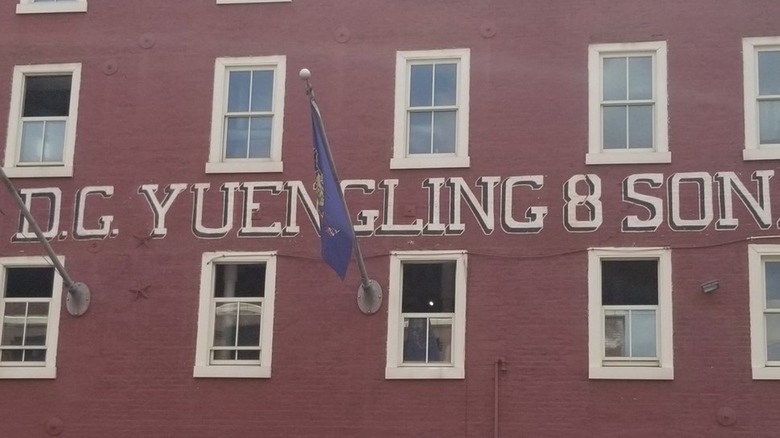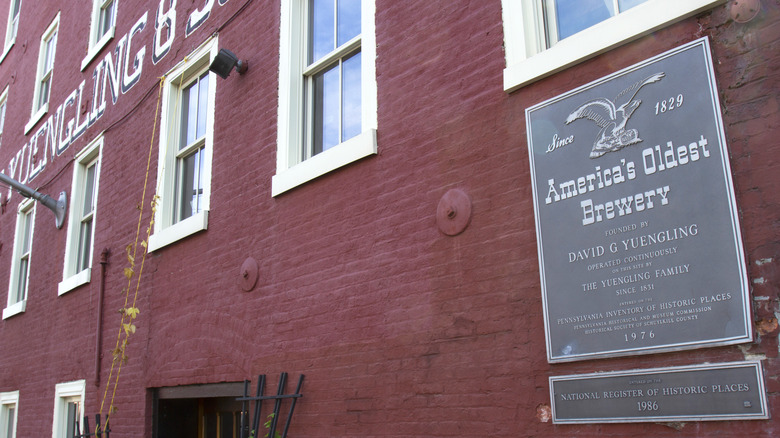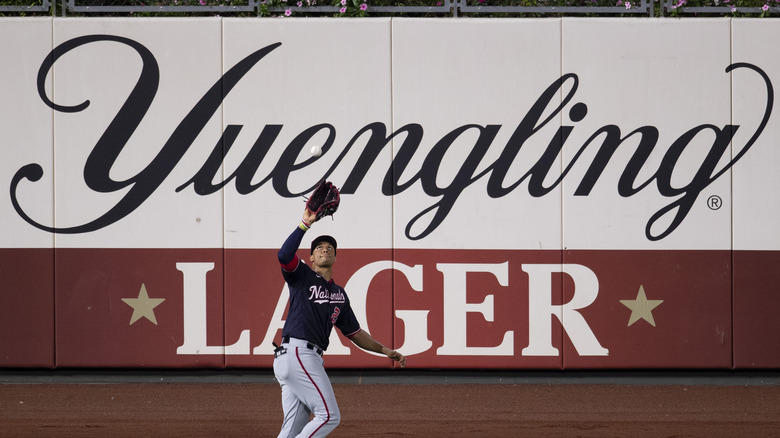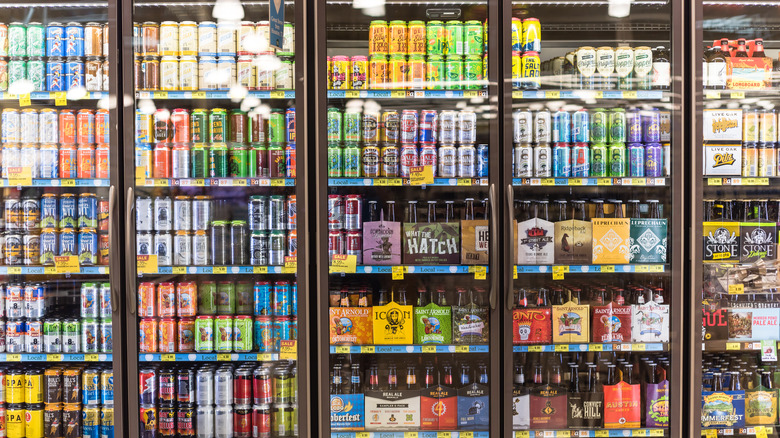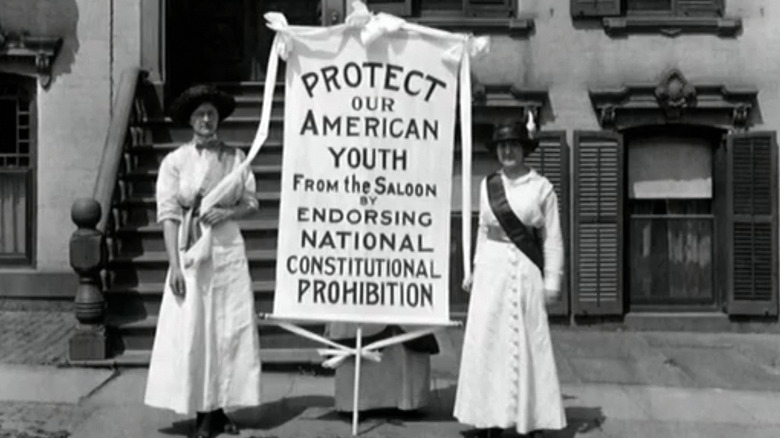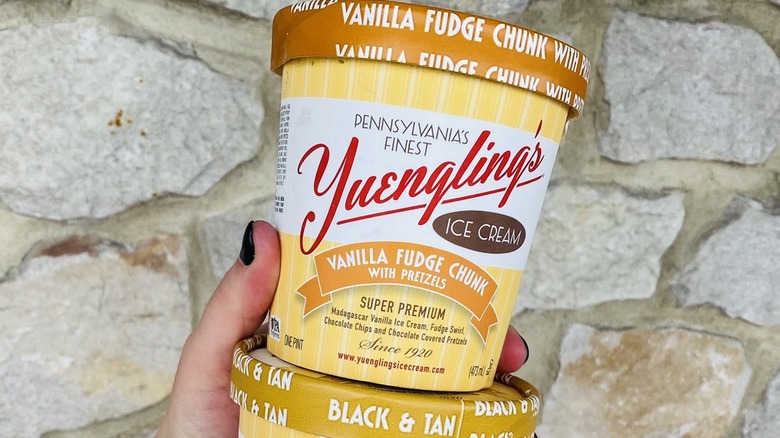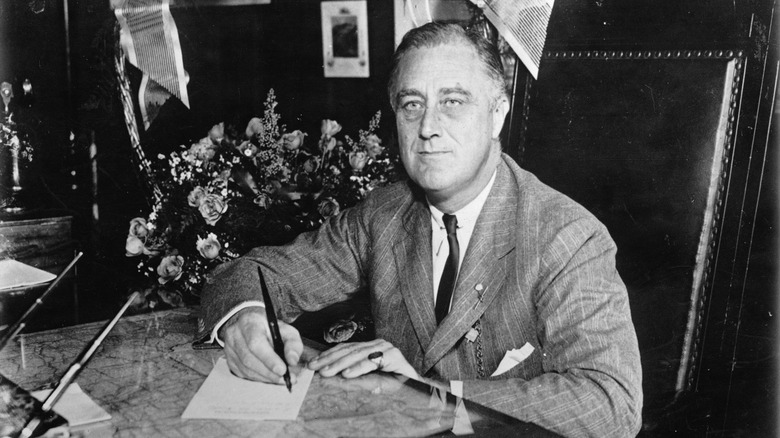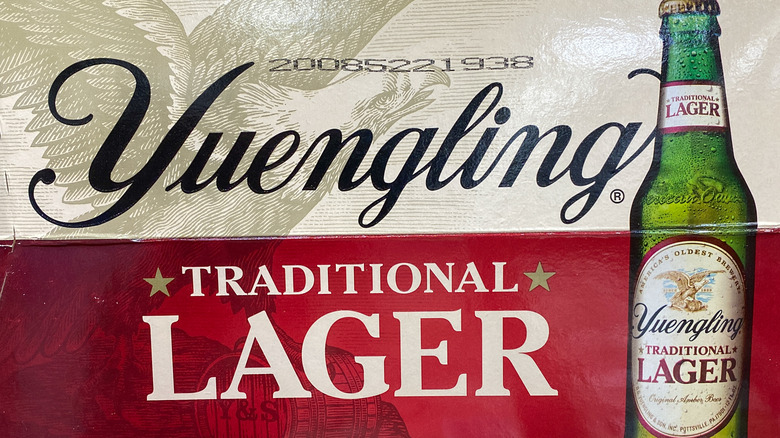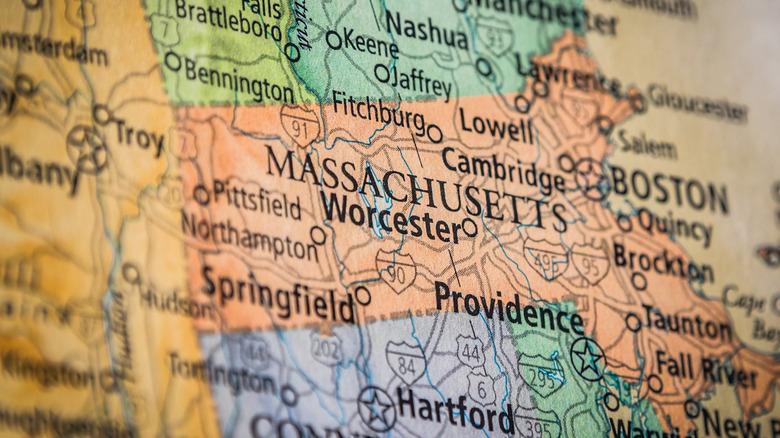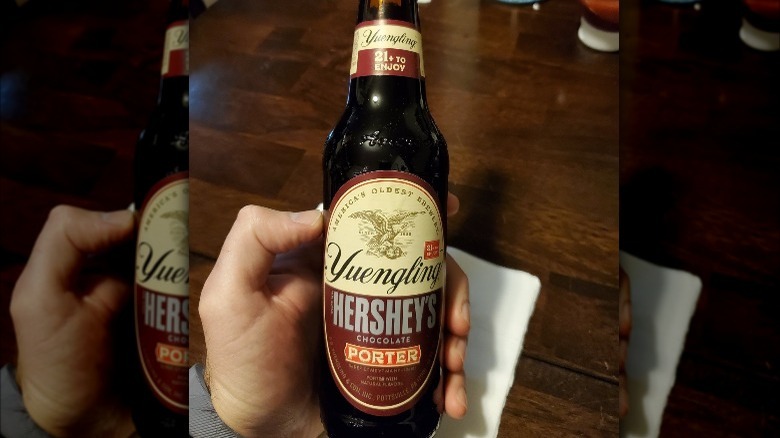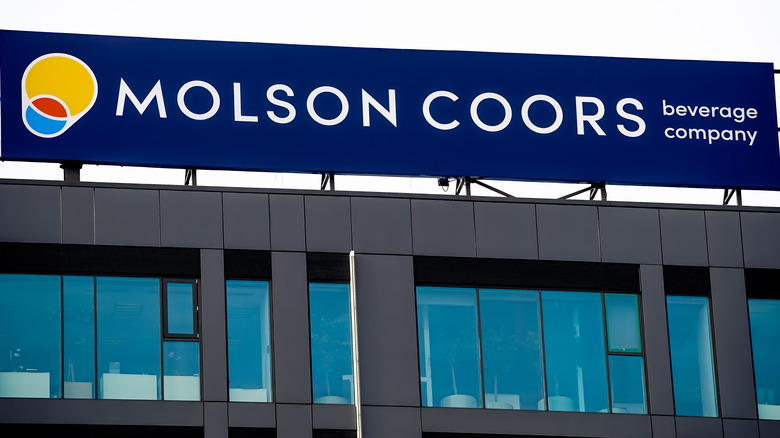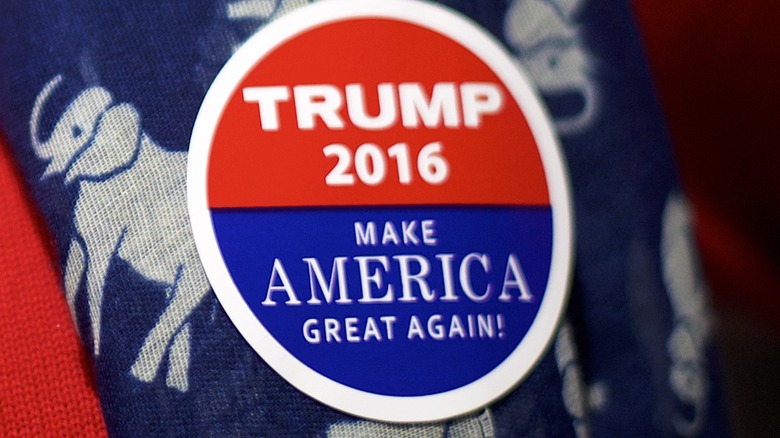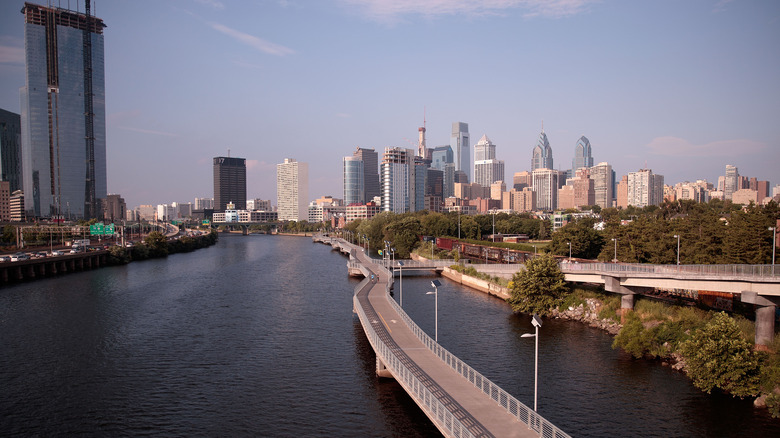The Untold Truth Of Yuengling
The title of America's oldest brewery is an illustrious and distinguished honor, but only one company can actually claim that crown: Yuengling. There's no dispute regarding the elder statesman of U.S. beer. All you have to do is look at the craft brewery's label, which proudly informs consumers of a legacy stretching back to 1829 — when it first opened under the name Eagle Brewery (via Yuengling).
Just as no one doubts the veracity of Yuengling's famed slogan, no one can deny the Pottsville, Pennsylvania-based brewery – which is still owned entirely by the Yuengling family as of 2022 — has become an American institution. With nearly two centuries of success behind it, the officially named D.G. Yuengling & Son Inc. isn't just entrenched in the U.S. craft beer landscape: It's a bonafide titan of the industry.
Of course, anyone who's ever lived in or around Pennsylvania knows it's tough to top a Yuengling Traditional Lager or its classic Black & Tan beer (made from a combination of dark and light brews). But as you might expect from a company that's been in business since Andrew Jackson's first year as president, there's more to Yuengling than delicious, dependable beer. We decided to take a deeper look at some of the uniquely intriguing facts surrounding the brewery and examine the untold truth of Yuengling.
Its Pottsville brewery is on the National Register of Historic Places
When you consider more than 95,000 different U.S. properties have been listed on the National Register of Historic Places since its founding in 1966 (via National Park Service), it's hard to envision a scenario where a brewery built in the 1830s wouldn't be included. Lo and behold, Yuengling's brewery in Pottsville, Pennsylvania, is, indeed, listed on the National Register of Historic Places.
The brewery was described as "a fine example of a late 19th and early 20th-century small-scale brewery" by Dr. Larry E. Tise, who announced the location's newly upgraded landmark status in 1985 (via The Morning Call). Contrary to popular belief, though, the landmark Pottsville brewery isn't the first Yuengling brewery operated by the company — it was actually the second brewery built by founder D.G. Yuengling, according to the company's website.
After a fire destroyed the original Eagle Brewery location in 1831, a new brewery was built at the company's current location. While the company eventually changed its name to the more well-known moniker of D.G. Yuengling and Son in 1873, the main headquarters for the craft brewery's operations has remained in the same place ever since — on Mahantongo Street in Pottsville.
It's been the best-selling U.S. craft brewery for seven years running as of 2022
For beer fans, it isn't exactly news to say the craft-brewing business has been booming in the U.S. over the past decade. After all, there were more than four times as many craft breweries operating in the U.S. in 2021 as there were in 2011. The exponential increase in available craft beers has naturally led to a congested and competitive market, but only one can top the charts. And, according to the Brewers Association, the best-selling craft brewery in 2021, and current reigning champion of the industry, is also America's oldest: Yuengling.
Actually, Yuengling's ascendance to the top of the craft-brewing scene isn't a recent phenomenon. In fact, it not only bested Boston Beer Company for the top spot on the Brewers Association rankings in 2020, too, but has also been the No. 1 best-selling craft brewery in the nation since 2015 (via PhillyVoice).
With seven consecutive years atop the craft-brewing industry, it's fair to wonder when (and if) Yuengling will finally forfeit its crown. Only time will tell, of course, but with just under 200 years of experience on its side, well ... let's just say we don't plan on betting against Yuengling any time soon.
It wasn't a craft brewery until the phrase was redefined in 2014
Given that Yuengling wasn't just the best-selling craft brewery in the U.S. in 2020 and 2021 but has been since 2015 (via PhillyVoice), it's fair to wonder what possible changes could have spurred its recent run of success. Interestingly enough, a 2014 event did, in fact, help elevate Yuengling to the top of the craft-brewery mountain. But the move wasn't by the company — it was a decision by the Brewers Association that year to change its definition of what a craft brewery actually is.
Craft breweries have always been defined by their smaller, independently owned status. But prior to 2014, brewers that used certain ingredients, or mainly produced lagers, weren't technically classified as craft breweries. Since Yuengling is known for its Traditional and Light lager varieties, this, in turn, disqualified it from inclusion, along with many other older, traditional U.S. breweries.
This wasn't the first time the Brewers Association amended its craft-brewery definition, having raised the maximum number of barrels a craft brewery could produce each year from 2 million to 6 million in 2010 (via The Street). But the decision to no longer exclude some of the oldest and most well-respected breweries from the craft-beer scene seems like the more impactful move from Yuengling's perspective.
The production of a so-called near beer kept it afloat during Prohibition
If you've ever seen an episode of HBO's criminally underrated period piece, "Boardwalk Empire," then you know how rough and tumble the U.S. was during Prohibition. For those alcohol-producing companies that didn't have a Richard Harrow type at their disposal, this meant finding creative (and legal) ways to stay in business during the nationwide ban of alcohol. For Yuengling, though, Prohibition simply meant it continued "legally pumping out beer," as Jen Yuengling told WNEP in 2020 — only it produced a "near-beer which (contained) one-half of 1% alcohol."
While the 18th Amendment prohibited alcohol's production and consumption, it didn't mention anything regarding the actual legal limit for alcohol content in a beverage (via National Institutes of Health). Consequently, the Volstead Act designated the legal limit for alcohol content at 0.5%, which led some brewers, like Yuengling, to continue producing beer with that drastically reduced alcohol by volume.
The company's near-beer proved to be "tremendously popular" with consumers, as Debbie Yuengling told History in 2019, helping the brewery persevere through the tumultuous period. And when Congress ratified the 21st Amendment and repealed Prohibition on December 5, 1933, Yuengling emerged ready to hit the ground running and resume its regular beer production.
Yuengling's Ice Cream was first sold during Prohibition to offset losses
A company choosing to diversify the products it makes and sells to the public is nothing new. But while many businesses can afford to take it slow when it comes to the growth of a new item, an amplified sense of urgency exists if your main output becomes illegal overnight. This was the position Yuengling found itself in at the start of Prohibition in January 1920, when its entire business model was nullified by the 18th Amendment. That led the company's president and owner, Frank D. Yuengling, to launch its own brand of ice cream (via Yuengling's Ice Cream).
Driven by an "unwavering dedication to the business," as Debbie Yuengling told History in 2019, Yuengling didn't take any half measures with his new venture. Consequently, not only did Yuengling's Ice Cream remain in business until the end of Prohibition, but it prospered for more than 60 years during its initial run.
Originally shuttered in 1985, Yuengling's Ice Cream made a triumphant return to the market in 2014. With 13 different flavors for sale as of 2022, it appears the brand was welcomed back with open arms. But what else would you expect from a Yuengling-branded product?
It delivered beer to FDR as a thank you after Prohibition ended
We'd venture a guess that millions of U.S. citizens were eager to show their appreciation for President Franklin Delano Roosevelt on December 5, 1933 — the day Prohibition was officially repealed (via National Archives). But the odds that any person or company delivered on that thought quite like Yuengling are slim to none. After all, Yuengling didn't just thank FDR; it sent an entire truckload of beer to the White House as thanks after Prohibition ended (via The Hill).
Eager to share its excitement at having "won the fight against Prohibition," the brewery "delivered a truckload of winter beer," as Jen Yuengling told WNEP in 2020. We weren't able to find any information regarding how the delivery was received, unfortunately, or whether FDR indulged in the free cases of Yuengling winter beer bestowed upon him. But since there's no evidence either way, we're choosing to believe he did.
Actually, there is reason to think FDR may have welcomed his truckload of gifted Yuengling with open arms. After all, when he signed a different law in March 1933 that legalized 3.2% beer, the president quipped, "I think this would be a good time for a beer."
Its signature Traditional Lager wasn't introduced until 1987
To say that Yuengling's Traditional Lager is synonymous with the brewery in its native Pennsylvania is obvious. In fact, as numerous comments from a 2014 BeerAdvocate discussion noted, Yuengling's signature brew is considered interchangeable with "lager" beer in the area. In other words, if you order a lager in the Keystone State without specifying a brand, you'll be handed a Yuengling. Given this, you may think the Traditional Lager is nearly as old as America's oldest brewery itself. But it's actually far younger, having only been introduced in 1987 (via Yuengling).
Now, with 35 years under its belt as of 2022, Yuengling Traditional Lager isn't some new kid on the block in a crowded craft market. But just as no one's denying the beer has the right stuff, a four-decade run doesn't change the fairly surprising fact that Yuengling's signature beer wasn't sold during its first 150 years in existence.
Though the company's website states its now most famous beer was devised from "a historic recipe," it's unclear what took Yuengling so long to start brewing the Traditional Lager. But since there's no feasible scenario under which it disappears from shelves at this point, we suppose that's the sort of question we don't need to answer.
Yuengling wasn't regularly sold in New England until 2014
Even though Yuengling has been around for close to two centuries, its distribution network is much smaller than many would guess. While it still isn't available in every state as of 2022, you'd probably expect it to be sold throughout the Northeast given its Pennsylvania location. Yet Yuengling wasn't available north of New York state prior to 2014, when the company finally secured distribution deals to sell its beer in Massachusetts, Rhode Island, and Connecticut, according to Brewbound.
Despite the substantial craft-brewing scene that exists in New England, "there (was) a very large buzz" surrounding Yuengling's introduction, as Rod Stack, vice president of sales at Hartford Distributors, said in 2014 (via Brewbound). Indeed, after just one year of sales in those three states, company owner, Dick Yuengling, described the move as a "huge success" in 2015 (via The Morning Call).
Alas, for the three northern New England states, Yuengling remains an elusive fantasy as of 2022. Though Yuengling told The Morning Call in 2015 a move to Vermont and New Hampshire was possible in the future, residents in both states (and in Maine) continue to wait for their chance to purchase Yuengling within their borders.
Hershey collaborated with Yuengling to develop a Chocolate Porter in 2019
When it comes to iconic Pennsylvania-based companies, few can match the stature of Hershey and Yuengling. Hershey may not have the same lengthy tenure as Yuengling, but that doesn't mean the fellow business that also started in the 19th century is any less beloved within Pennsylvania's borders. Given the immense joy the two companies bring to their consumers, then, it's only fitting they decided to collaborate in 2019, releasing the Yuengling Hershey's Chocolate Porter (via PennLive.com).
Like the successful collaboration between Harpoon Brewery and Dunkin' (with the most recent Harpoon Dunkin' beer flavors released in September 2022), the partnership between Yuengling and Hershey appears to have been a smashing success. First sold in select markets in October 2019, Yuengling Hershey's Chocolate Porter didn't become a one-shot deal. In fact, the brewery has been "blown away by the excitement ... fans show for this special collaboration beer," Jen Yuengling said in a press release in September 2021, announcing that year's release date.
For its third year on the market, the two companies decided to embrace Halloween for the Chocolate Porter, announcing the beer would be in stores by the end of September that year. The chance to "kick off the haunted, candy-filled season and ... celebrate this one-of-a-kind chocolate brew" was too enticing to resist, as Ernie Savo, senior director of global licensing at Hershey, said in the press release (via Yuengling).
It partnered with Molson Coors in 2020 to expand westward
Yuengling hasn't yet made the leap to nationwide sales as of 2022, but that doesn't mean it lacks the ambition to expand. Of course, since ensuring the company remains independent and family-owned is of paramount importance, the number of options available for expansion is slightly limited. But creative solutions can lead to productive partnerships, and, in 2020, America's oldest brewery agreed to a joint venture deal with Molson Coors to increase its national distribution network (via CNN).
Now, to be perfectly clear, the agreement between the craft brewery and the international conglomerate was not a merger or sale. Under the terms of the agreement, Yuengling would simply utilize Molson Coors breweries to make its own beer, which would then be sold in central and western U.S. states. In fact, the deal actually created a new company separate from both Yuengling and Molson Coors, with a board of directors split evenly with reps from both companies (via Yuengling).
Though the company would use Molson Coors breweries for production, fans shouldn't fret about any changes to the Yuengling beers they know and love. After all, as Jen Yuengling said in a press release in September 2020 (via Yuengling), the partnership would only consist of brewing "the same Yuengling recipes" people have come to expect.
The owner's 2016 Trump endorsement led to boycott calls
No matter where you stand politically in 2022 (side note: make sure you register to vote!), it's hard to think of a more polarizing figure than former president Donald Trump. There's no denying the man sparks an unbridled fervor in folks across the political spectrum. Perhaps, then, brewing company owner Dick Yuengling should have known his public endorsement of Trump would inevitably lead to boycott calls — as it did in 2016, according to Forbes.
After hosting the then-presidential candidate's son, Eric, at the brewery in 2016 — and allegedly telling him "we need (your father) in there" (via Forbes) — calls decrying Yuengling's political preference were seen on social media. This included a Facebook post by openly gay Pennsylvania State Rep. Brian Sims, which ended with "goodbye Yuengling and shame on you."
The company, and Dick Yuengling himself, were taken aback by the response. "I didn't expect it would be such a big story," he told Billy Penn in March 2017. Still, despite the backlash, any actual boycotts didn't seem to cause any real damage to the brand, with "nothing noticeable" occurring with its sales in the aftermath.
Clean Water Act violations resulted in a $2.8 million EPA fine in 2016
Whether people want to acknowledge the detrimental effects of pollution on Mother Nature or not, it doesn't change the fact the planet is dying before our very eyes. And the existence of large corporations skirting environmental regulations only exacerbates this pre-existing problem. Perhaps this explains why the U.S. Environmental Protection Agency and U.S. Department of Justice cracked down on Yuengling in 2016, after its Pottsville breweries were allegedly found to have been improperly discharging pollutants into a public wastewater treatment plant (via the EPA).
Between 2008 and 2015, the craft brewing company committed a number of "serious violations" of the Clean Water Act, according to EPA Regional Administrator Shawn M. Garvin (via U.S. Department of Justice). In addition, Garvin noted Yuengling's lack of engagement or efforts to fix the problem "resulted in this enforcement action" — meaning the company's alleged refusal to play by the rules led to a steeper penalty.
Sending untreated wastewater to the treatment plant dozens of times over the years presented "a potential risk to the Schuylkill River" (via U.S. Department of Justice). Yuengling decided to settle with the government and signed a consent decree that included a $2.8 million fine. In addition, the decree tasked the company with spending $7 million on improving and upgrading its facilities to comply with environmental regulations, requiring it "put into place an environmental management system," as then-assistant Attorney General John C. Cruden stated at the time (via U.S. Department of Justice).
